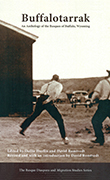Buffalotarrak: An Anthology of
the Basques of Buffalo, Wyoming
Purchase
In 1903 the cattle barons no longer controlled the seven-eighths
of Wyoming that made up the open range. Poor management, blizzards in 1886 and 1887, and the 1892 Johnson County Cattle War
broke the cattleman's hold on the vast grassland. Sheep increased year by year as the cattle kingdoms faded. By 1909 Wyoming
boasted the nation's highest sheep numbers, and the Basque people were putting down roots that would make them the dominant
sheep ranchers in Johnson County.
In the first years of the twentieth century, unmarried Basque men came to Buffalo to work as sheepherders. In order to build
up flocks of their own and start their own ranches, they often took sheep in lieu of wages. Unmarried Basque women also came
to Buffalo looking for work, usually as domestics. Their wages were often used to pay back the price of their passage to
the United States.
Both the men and women hoped for romance as well as work in their new lives. Soon sheepherders and domestics began to marry.
The Catholic church bells rang and the Basque couples found themselves creating a new community in Buffalo, Wyoming, the
community of the Buffalotarrak, the ones who live in Buffalo.
Selections from Buffalorarrak
1920: Buffalo: Amatxi, Grandmother, the Dignity of Work
for Jeanne Etchemendy Iberlin
No top-soil, no shuffle and leap to the shouts of the fandango. No Saturday jai-alai. No Sunday walks in the sweet sun,
the music playing from the leaves on the trees. No rain, no rolling down deep, green, soft hillsides. No home, no friends,
no family.
Sometimes for this woman, this human being who for fity years will be known to all as Amatxi, it seems there is only nothing,
plenty of nothing. But it's not true. As sure as the snow will fall again and bathe this empty land in brilliance and beauty,
there is something. There is the dignity of work. She meditates on this and smiles secretly to herself. The man who
thinks the worker doesn't meditate on the meaning of her acts is a fool or an owner.
A single woman among forty lonely sheephearders, she was married within months of arriving here. Hw as a shy man, quiet
though not really dignified. How he caught this belle of the west is a mystery about which no one has a clue.
She walks twice a day from her house in town to a pasture a mile away. Twice a day she milks her cow. Letting her hands
rise from her pockets, she warms them under her arms, blows across her fingertips. Gently, she squeezes and pulls, sliding
the inside of her thumb and palm along the cow's pink, shining skin. She turns the cow's udder so the snow-white milk strikes
the pail obliquely, the way rain strikes a windowpane and slides without splashing. The bucket full, she hefts it up and
walks home. She follows the same route each day and each day sees how this town is more like the Basque homeland, more like
the world than she would have thought, how all three are ever-changing and ever the same.
Reviews
